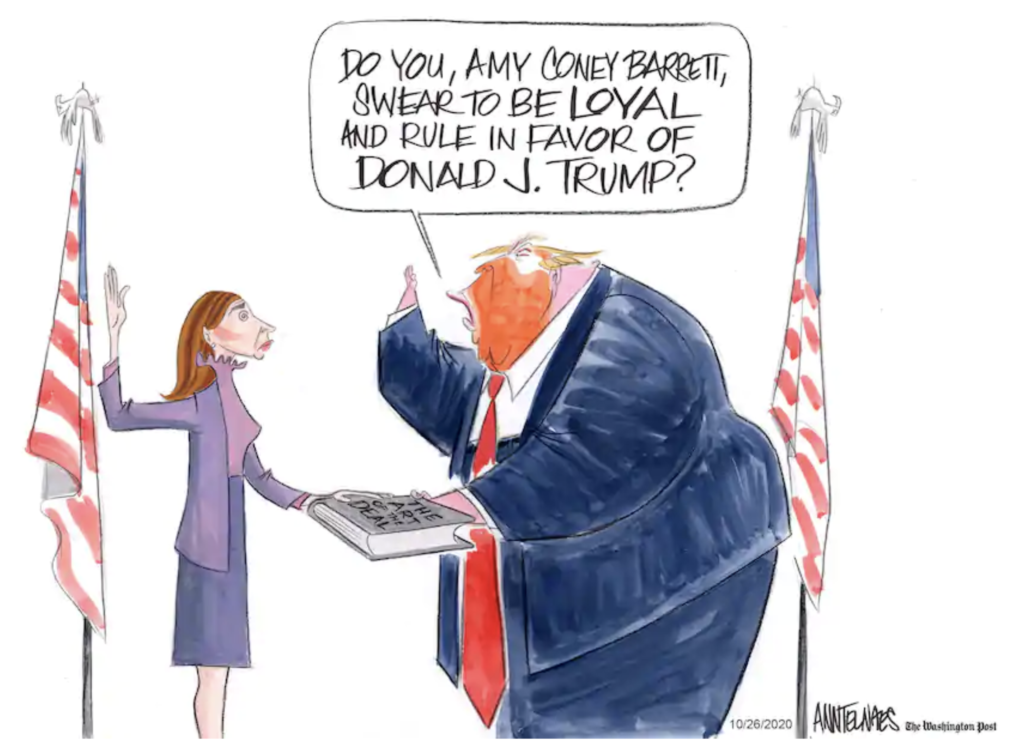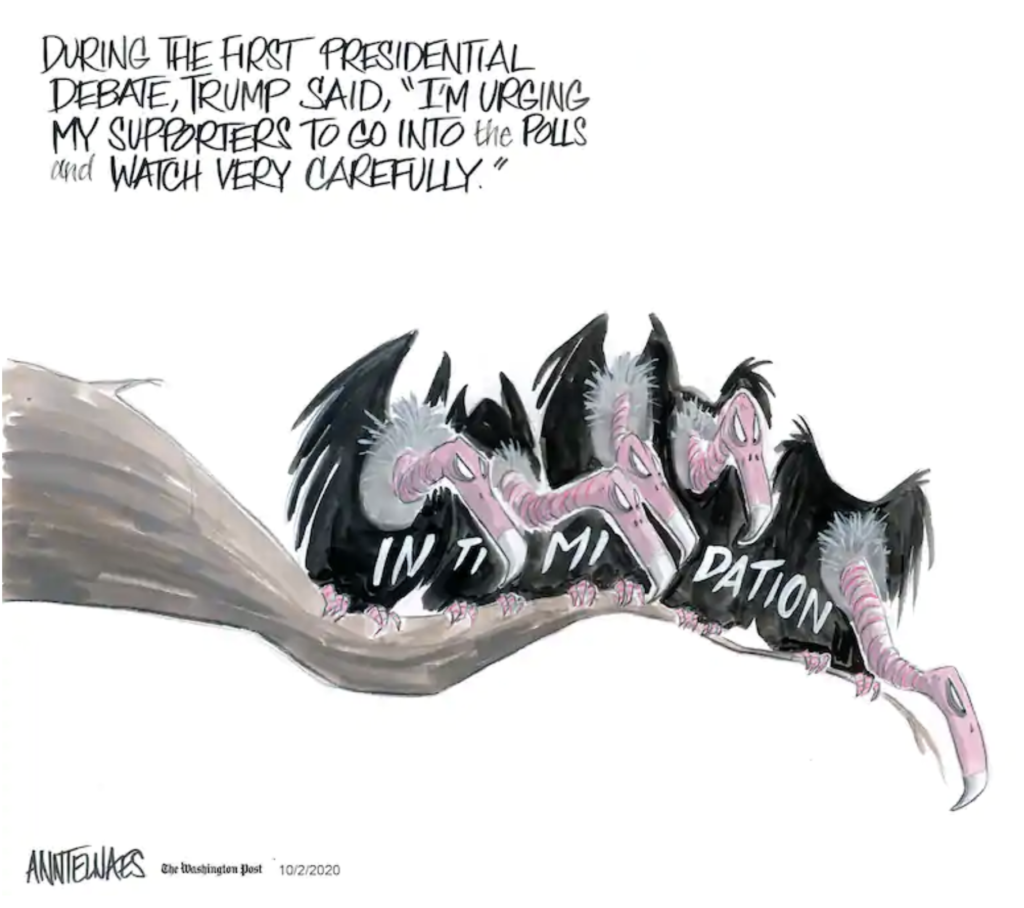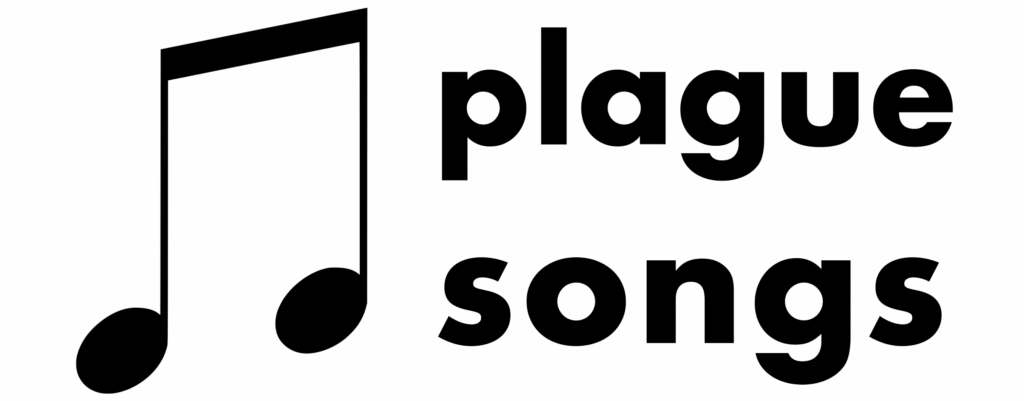This one’s for U.S. Election Day 2020, in which we address two key questions. Will the U.S. continue down the path of autocracy? Or will it commit to the work of rebuilding democracy?
When 21-year-old Stephen Stills wrote (and his band, the Buffalo Springfield recorded) “For What It’s Worth” in 1966, America was in tumult. But it had just a year earlier passed the Voting Rights Act, expanding the franchise and making the United States a better democracy.
In 1967, the song was both a top-ten hit for the Buffalo Springfield and a #66 hit for the Staple Singers. I expect their cover version strengthened the song’s association with the civil rights movement and with parallel efforts to improve democracy.
Since the Roberts Supreme Court (in Shelby County v. Holder, 2013) gutted the Voting Rights Act, U.S. democracy has been in rapid decline, as Republicans attack the right to vote. As the late Justice Ruth Bader Ginsburg wrote in her prescient dissent to Shelby, “Throwing out preclearance when it has worked and is continuing to work to stop discriminatory changes is like throwing away your umbrella in a rainstorm because you are not getting wet.”
Indeed, the demolition of the Voting Rights Act leads us directly to our present moment, in which the Democratic Party works to get out the vote, but the Republican Party seeks only to consolidate its power by any means it can: suppressing the vote, refusing to count votes that have already been cast, seizing control of the judiciary, and not always bothering anymore to swathe its power-grab in semi-plausible lies.

So, we face an election that the Republican Party is working to rig in its favor, and that the Democratic Party is fighting to win by traditional means. The Republican Party’s cheating should disqualify them and their candidates from ever seeking office again. If a team cheats in sports, that team is disqualified. However, if a candidate cheats (as Trump did in 2016 and is doing now), are we supposed to simply respect the theft? No. The 2016 presidential “election” was illegitimate, and the Republicans are working even harder to make the 2020 election illegitimate.

If your only path to “winning” is theft, you should be barred from the competition. Period.
So. Should the Democrats prevail, we will have to pass the John Lewis Voting Rights Act and expand the Supreme Court to preserve that and to counter Republican court-packing.
As I write these words, we do not yet know who will prevail. Hence my choice of this particular song, which begins by setting the scene: “There’s something happening here. / What it is ain’t exactly clear. / There’s a man with a gun over there, / Telling me I got to beware.”
“For What It’s Worth” has re-emerged this year – notably in a cover by Billy Potter (with Stills on guitar), recorded for the Democratic National Convention.
The gunshots in the production evoke the anti-Black terrorism perpetrated by US police. Porter’s call for change (near the end) and the video’s imagery directly invoke the movement for Black Lives. That’s one reason that the Porter-Stills version leads my election 2020 playlist, “This Mix Kills Fascists.”
Here is the best-case scenario. If the Biden-Harris ticket manages to overcome Republican cheating and Russian interference to gain a clear electoral victory, Trump is unlikely to accept defeat gracefully – if at all. He will exhort his followers to violence. They will kill people. That said, a large enough electoral victory should forestall the judicial coup Trump and his party have been working towards. And I think that, in such a situation, the US Military would back Joe Biden. If Trump refuses to step down, the military will escort him from the premises.
Here is the worst-cast scenario. The combination of voter suppression, voter intimidation, sabotage of the US Postal Service, and foreign interference in voter tallies tips the official count to Trump. He and the Republicans claim their stolen “victory” as legitimate. Should that occur, we will all need to take to the streets and protest until the Autocrat steps down. And we will do so knowing that he will send his unmarked secret police to brutalize us.
Of course, given that Captain Covid is unlikely to concede, we may need to take to the streets, irrespective of the official count.
In an attempt at a hopeful coda, I’ll conclude with a 1978 episode of The Muppet Show, in which woodland creatures perform “For What It’s Worth” – the original first verse, plus two new verses – as an anti-hunting anthem.
Spoiler alert: in the Muppets’ universe, the friendly animals prevail. The old men with guns do not.

Have you ever wanted to perform a song? Sure you have. If you’re looking for pandemic-related ideas (which is how this #PlagueSongs series of my began), the playlist below will give you many places to start.
- Plague Songs
- Sing. Sing a Song. #PlagueSongs, no. 1Â (17 Mar. 2020). Gloria Gaynor’s “I Will Survive.”
- Do Not Touch Your Face. #PlagueSongs, no. 2 (24 Mar. 2020). The Weeknd’s “I Can’t Feel My Face.”
- The Bright Side. #PlagueSongs, no. 3 (31 Mar. 2020). Monty Python’s “Always Look on the Bright Side of Life.” Also the first post where I began my practice of using a lyric as the title.
- It’s later than you think. #PlagueSongs, no. 4 (7 Apr. 2020). Prince Buster’s “Enjoy Yourself.” (Also: the discovery that I cannot play ska.)
- There doesn’t seem to be anyone around. #PlagueSongs, no. 5 (14 Apr. 2020). Tommy James and the Shondells’ “I Think We’re Alone Now.”
- Be an optimist instead. #PlagueSongs, no. 6 (21 Apr. 2020). The Kinks’ “Better Things.”
- Kick at the darkness. #PlagueSongs, no. 7 (28 Apr. 2020). Bruce Cockburn’s “Lovers in a Dangerous Time.”
- So far away, but still so near. #PlagueSongs, no. 8 (5 May 2020). Robyn’s “Dancing on My Own.”
- If you just call me. #PlagueSongs, no. 9 (12 May 2020). Bill Withers’ “Lean on Me.”
- In the end, they’ll be the only ones there. #PlagueSongs, no. 10 (19 May 2020). Hanson’s “MMMBop,” and a few chords from Nirvana’s “Smells Like Teen Spirit.”
- No matter how I struggle and strive. #PlagueSongs, no. 11 (25 May 2020). Hank Williams’ “I’ll Never Get Out of This World Alive.”
- Love. #PlagueSongs, no. 12 (1 June 2020). Medley of Nick Lowe’s “(What’s so Funny ‘Bout) Peace Love, and Understanding” and the O’Jays’ “Love Train,” with brief snippets of the Staple Singers’ “This Train” and the Beatles’ “All You Need Is Love.”
- This is the time. #PlagueSongs, no. 13 (9 June 2020). Lou Reed’s “There Is No Time.”
- My neighbor and my friend. #PlagueSongs, no. 14 (16 June 2020). Fred Rogers’ “Won’t You Be My Neighbor.”
- If you’re lost, I’m right behind. #PlagueSongs, no. 15 (23 June 2020). Everything But the Girl’s “We Walk the Same Line.”
- Live to see another day. #PlagueSongs, no. 16 (30 June 2020). The Bee Gees’ “Stayin’ Alive.”
- Offer me solutions, offer me alternatives, and I decline. #PlagueSongs, no. 17 (7 July 2020). R.E.M.’s “It’s the End of the World as We Know It (and I Feel Fine).”
- Someday we’ll find it. #PlagueSongs, no. 18 (14 July 2020). Kermit the Frog’s “Rainbow Connection.”
- Can’t control my brain. #PlagueSongs, no. 19 (21 July 2020). Ramones’ “I Wanna Be Sedated.”
- 4’33” #PlagueSongs, no. 20. AND 43 notes on silence, time, and the corona era (28 July 2020). John Cage’s 4’33”, plus an essay inspired by the piece.
- Mann, wer hätte das gedacht, dass es einmal soweit kommt #PlagueSongs, no. 21 (4 Aug. 2020). Nena’s “99 Luftballons.”
- Banish sadness and strife. #PlagueSongs, no. 22 (11 Aug. 2020). “Look for the Silver Lining,” composed by Jerome Kern and Buddy DeSylva. My version is based on the Chet Baker recording.
- Don’t write yourself off yet. #PlagueSongs, no. 23 (27 Oct. 2020). Jimmy Eat World’s “The Middle.”
- What Is Your COVID-19 Routine?
- What Is Your COVID-19 Routine? (22 Mar. 2020)
- What Is Your COVID-19 Routine? Part 2 (5 Apr. 2020)
- What Is Your COVID-19 Routine? Part 3 (19 Apr. 2020)
- What Is Your COVID-19 Routine? Part 4 (16 May 2020)
- What Is Your COVID-19 Routine? Part 5 (29 June 2020)
- Resist the Regime
- “Fight Fascism. Vote Clinton.” (Dedicate Your No-Trump Vote, 30 Sept. 2016)
- Surviving Trumpism. Restoring Democracy. (12 Nov. 2016). I wrote this less than a week after the 2016 election.
- The Public University in an Age of Alt-Facts: Remarks on Receiving a Higuchi Award (13 Dec. 2016)
- “Resolutions for a New Academic Year: A survival guide for higher education in perilous times” (Chronicle of Higher Education, 5 Sept. 2017)
- RESIST! Year #2 begins NOW. (7 Nov. 2017)
- Why Trump Jails Crying Children. How We Resist. (A Twitter Essay)Â (21 June 2018)
- RESIST! A mix for 2019Â (30 Jan. 2019)
- Kansas’ Distinguished Professors call for end to International Student Ban (11 July 2020)
- A Democracy, If We Can Keep It (29 Aug. 2020)
- This Mix Kills Fascists (30 Sept. 2020). My RESIST! mix for 2020.
- Children’s Literature vs. the Regime
- Refugee Stories for Young Readers (Public Books, 23 Mar. 2017). Francesca Sanna’s The Journey and other contemporary refugee tales for children.
- Donald and the Golden Crayon (20 Oct. 2018). The first book to adapt Crockett Johnson’s children’s books for political satire.
- Migration, Refugees, and Diaspora in Children’s Literature (ChLAQ) (11 Dec. 2018). Blog post announcing special issue of the Children’s Literature Association Quarterly on this subject, including excerpts from my introduction.
- Harold vs. Donald, round 2Â (9 Sept. 2019)
- “Trump is a liar. Tell children the truth” (Public Books, 15 Oct. 2019). See also the related blog post on the essay.
- “A Manifesto for Radical Children’s Literature (and an Argument Against Radical Aesthetics)” (Barnboken: tidskrift för barnlitteraturforskning/Journal of Children’s Literature Research no. 42, Dec. 2019)
